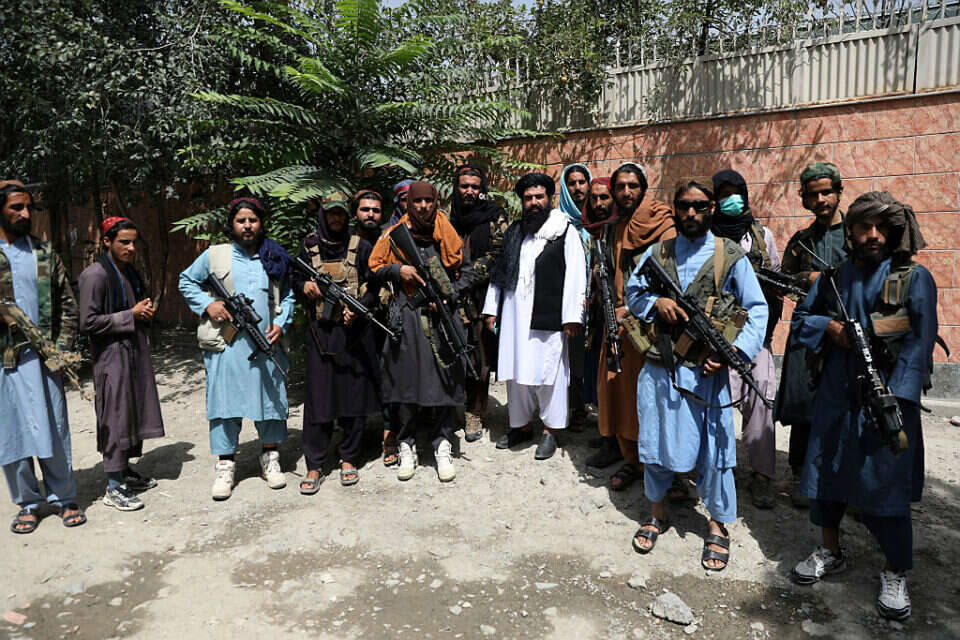What was estimated to happen, is indeed happening.
Former enemies are stuck in difficult talks to form a government that will connect the Taliban with its enemies in Kabul, even though both sides are under pressure to take steps to bring civil war closer.
The Taliban and the close circle of ousted President Ashraf Ghani worked together - through a complex network of ties and relations on the ground - to prevent a bigger war at Kabul's gates last week.
These relationships are coming now, when past enemies of the past are quietly negotiating a coalition government and a broader distribution of forces. And will only serve as part of the proxy clashes in the area.
A Taliban man shoots a civilian trying to escape Kabul
Taliban leaders, former senior members of Ashraf Ghani's government, and former Northern Alliance commanders scattered between the Pakistani capital Islamabad and Punjesh have come a long way in talks to form a transitional government in Kabul.
A source who is in contact with key figures in the Northern Alliance who visit the Pakistani capital even paints an optimistic picture regarding behind-the-scenes talks from Punjab to Kabul, Islamabad, via Doha - to Washington.
This occurs with two parallel developments.
Taliban commanders opposed calls from particularly conservative elements to unilaterally declare the formation of an Islamic Emirate government in Afghanistan.
The other development is that Ahmad Massoud, the leader of the Afghanistan National Resistance Front, met with Taliban representatives in Punjesh, the seat of the leader of the Afghan fighters against the USSR - Ahmad Shah Massoud.
Taliban fighters in Kabul, E.P.
Massoud, most of the former Northern Alliance commanders and members of Kabul's previous government also refrained from announcing unilateral measures, such as the declaration of an exiled government - despite many contacts examining the legal feasibility of the move.
The talks are in full swing, far from the international media focusing on the disturbing sights from the Hamid Karzai International Airport area in Kabul, as well as the heartbreaking stories of journalists, human rights activists and Afghans working with international forces.
Each of them doubts the Taliban's moderation narrative.
At the same time, Massoud is talking to the Taliban and holding talks with the West - in order to mobilize support for its forces in Punjash, an area in northern Afghanistan that the Taliban has so far refrained from dealing with - where anti-Taliban activities are concentrated. The Northern Alliance has been fighting the Taliban from Punjesh for much of the 1990s, but has failed to subdue them - until increased US and NATO aid after the 9/11 attacks. The alliance merging into the successful Afghan governments began in November 2001, and its commanders were in positions of power until Ashraf Ghani's escape last week.
Both the Northern Alliance and the Taliban are "Mujahideen" (fighters in Hebrew), representing an extremist version of Islam that has hit Afghanistan over the four decades that has been a tool during Western attempts to advance normalization procedures among Afghan civil society.
Many Afghans see the Northern Alliance and the Taliban as two parts of the same side of the coin.
Former Western-backed Northern Alliance commanders have failed to translate unprecedented international support into lasting change in Afghanistan, largely because they agree with many parts of the Taliban's regressive policies, especially on women's rights, education and governance.
Pakistan's ambassador to Kabul, Mansour Ahmad Khan, even said that "both sides hope to form a comprehensive government."
Dismissed Afghan President Ashraf Ghani, Reuters
Prior to the 9/11 attacks in the Northern Alliance, Iran, India, and Russia backed the Taliban, receiving aid from Pakistan, the Gulf states, and the United States. However, in the 20 years since 2001, the story has been reorganized. To recreate the proxy war of the 1990s.
If so, much is at stake in the secret talks between former Northern Alliance commanders, Massoud's men in Punjab and the Taliban.
A group of senior members of the Northern Alliance has been in Islamabad since August 15, extending its stay - which increases hopes for a power-sharing agreement.

